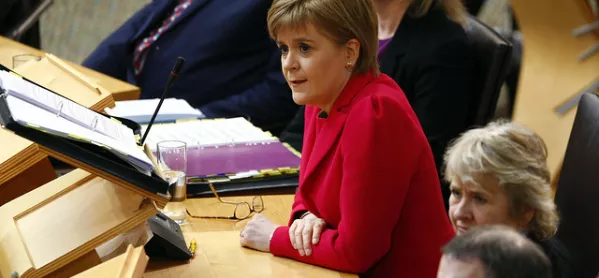Scottish first minister Nicola Sturgeon has been forced to defend changes to the education system amid concerns that pupils now study fewer subjects in the fourth year of secondary school.
Ms Sturgeon was grilled over the so-called subject choice crisis during First Minister’s Questions today by Scottish Conservative leader Jackson Carlaw, as well as Tory education spokeswoman Liz Smith, Green education spokesman Ross Greer and Labour MSP Johann Lamont.
However, Ms Sturgeon hit back, saying that the senior phase in school does not consist only of S4, but lasts for three years.
Quick read: ‘Weak’ arguments for teaching different exam courses together
New statistics: The subjects on the rise and on the slide in Scotland
Long read: Is Scotland’s curriculum really narrowing?
It was the qualifications that pupils had by the time they left school that mattered “not just the subjects that they study at S4”, said Ms Sturgeon.
She added: “More young people are leaving school with qualifications, the number of young people who leave school with five Highers or more has gone up and there are record numbers in higher education, including record numbers of students from deprived areas.
“I am the first to concede that we have more work to do. That is why we are getting on and doing it. However, the evidence that I have just read out says that young people in our schools and our education system are performing well, and they and their teachers should be congratulated on it.”
However, Mr Carlaw accused Ms Sturgeon of being in denial and said that Scotland was once famed around the world for the breadth of its education, but now “Curriculum for Excellence is narrowing horizons”.
Ms Smith said the “biggest concern” for parents and pupils was “the growing inequity in subject choice”, with some pupils able to study six subjects in S4 while others took seven or eight.
“Many parents feel that their youngsters are being disadvantaged when it comes to college and university applications,” she added.
Mr Greer said that “the number of subjects on offer to young people, particularly at higher level, has a direct correspondence with the level of deprivation in their community”.
This week, the director of the Reform Scotland think tank - which published a report into subject choice - warned that a new attainment gap was in danger of opening up in Scotland, “where children who are allowed to sit eight or nine National 4s or 5s will have a distinct advantage over those restricted to five or six”.
Yesterday, the MSPs on the Scottish Parliament’s Education and Skills Committee - which is conducting an inquiry into the apparent narrowing of subject choices in Scottish schools - heard from the University of Dundee’s Professor Jim Scott that, as a result of the narrowing of the curriculum in S4, a wide range of subjects were struggling: modern languages, ICT, arts, and science, technology, engineering and mathematics (Stem) subjects.
Professor Scott, a former secondary headteacher, said that roughly half of Scotland’s schools were now offering six subjects in S4 and that the narrowing of the curriculum had spread through parts of Scotland like a “virus”.
“We are in danger of a generation going past who have not had a good experience in education,” he warned.




